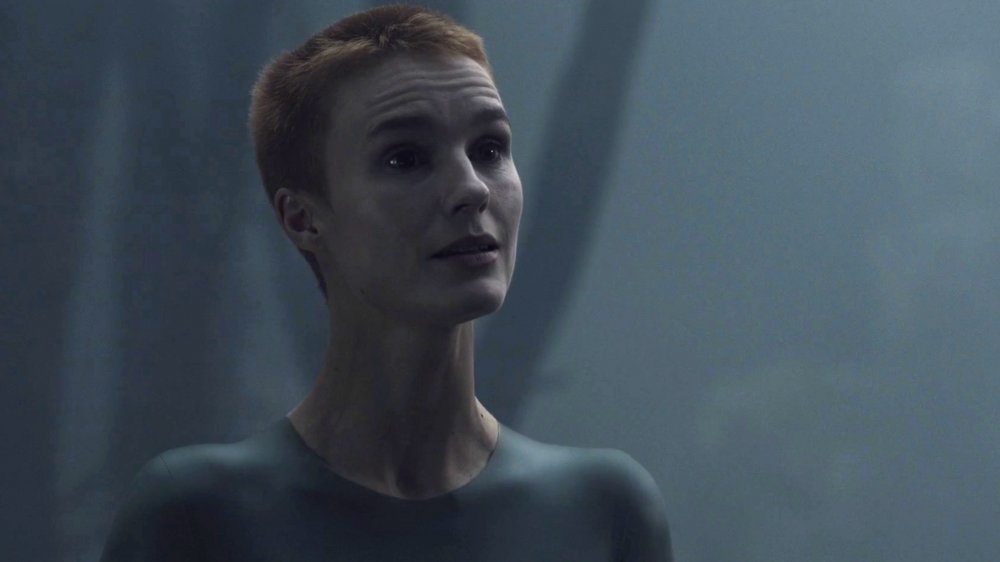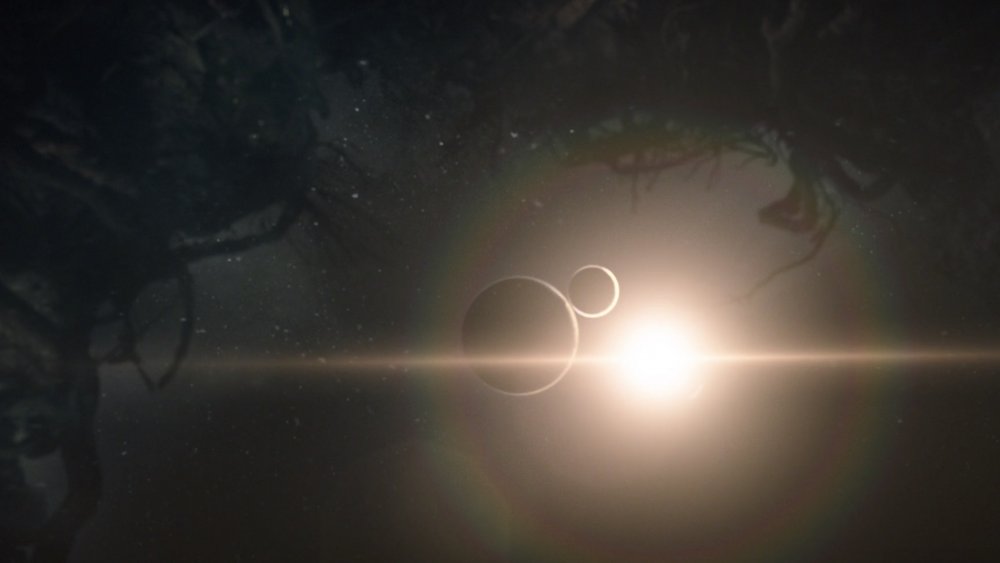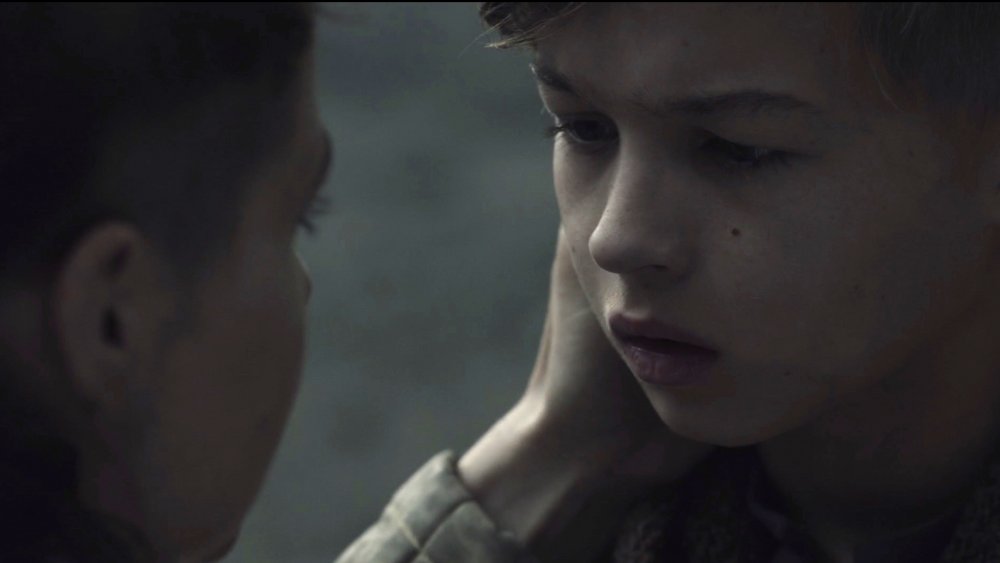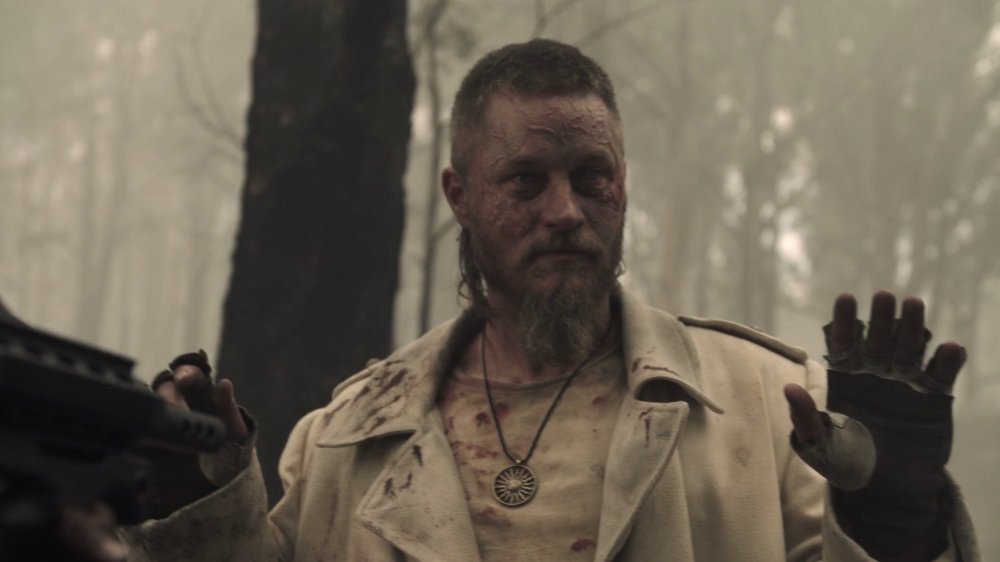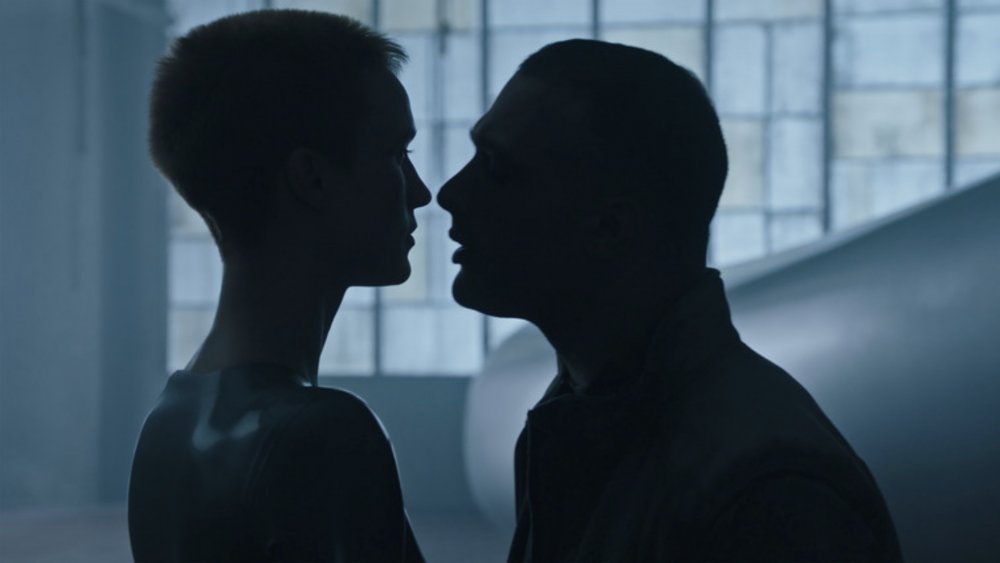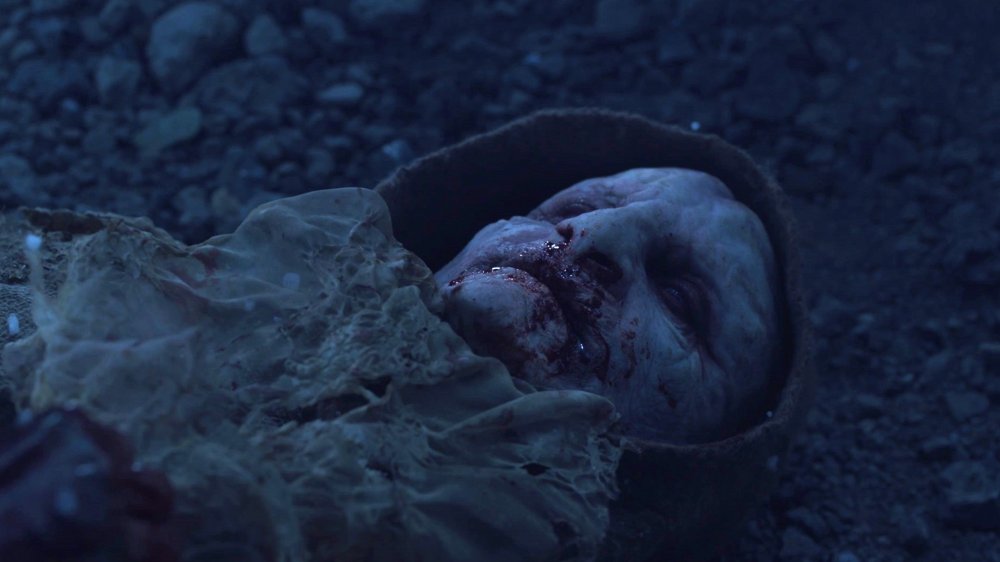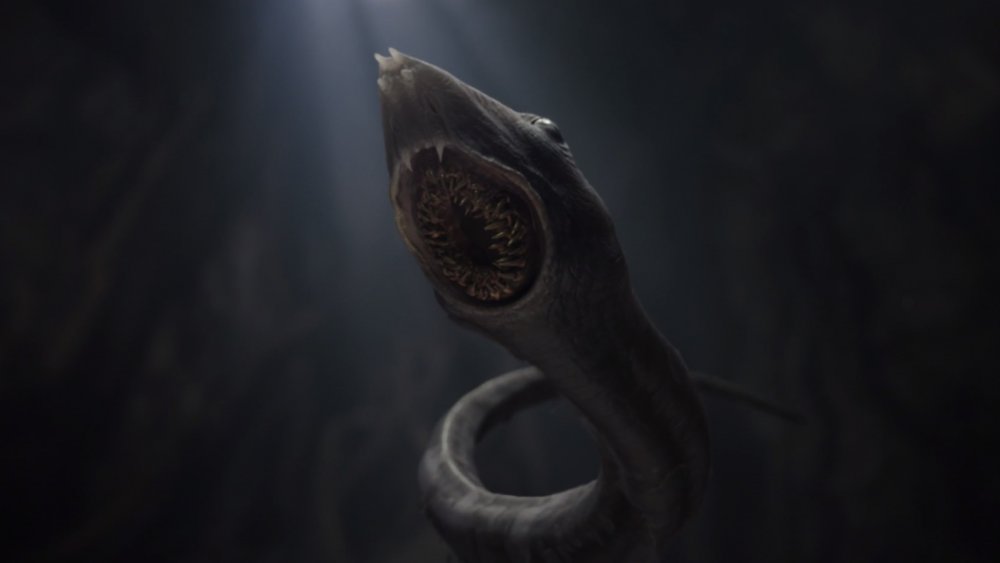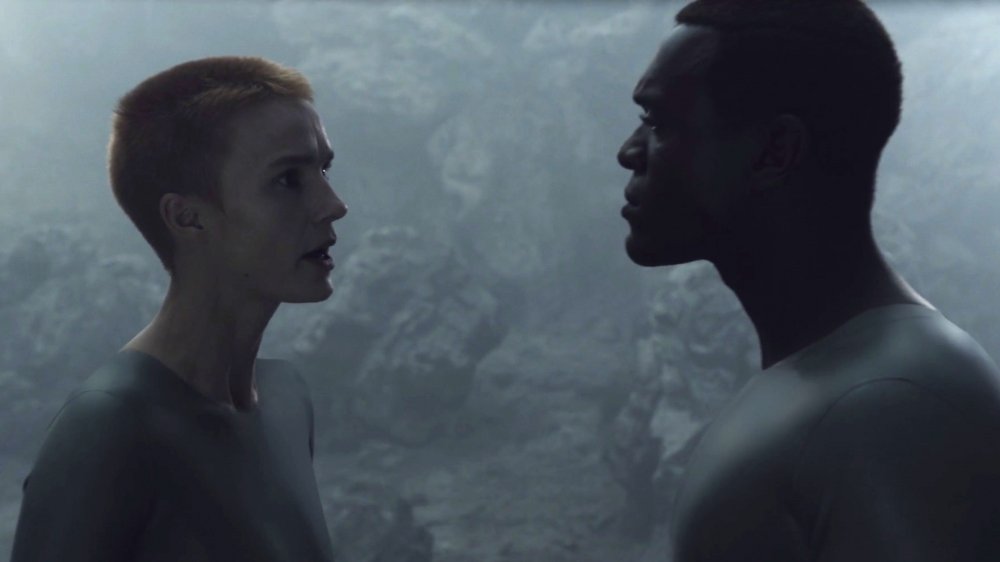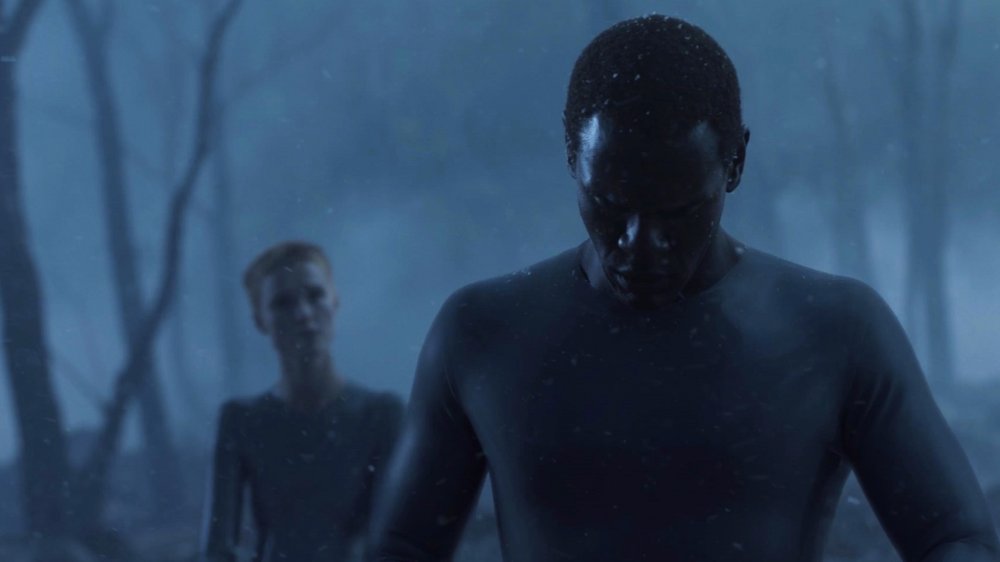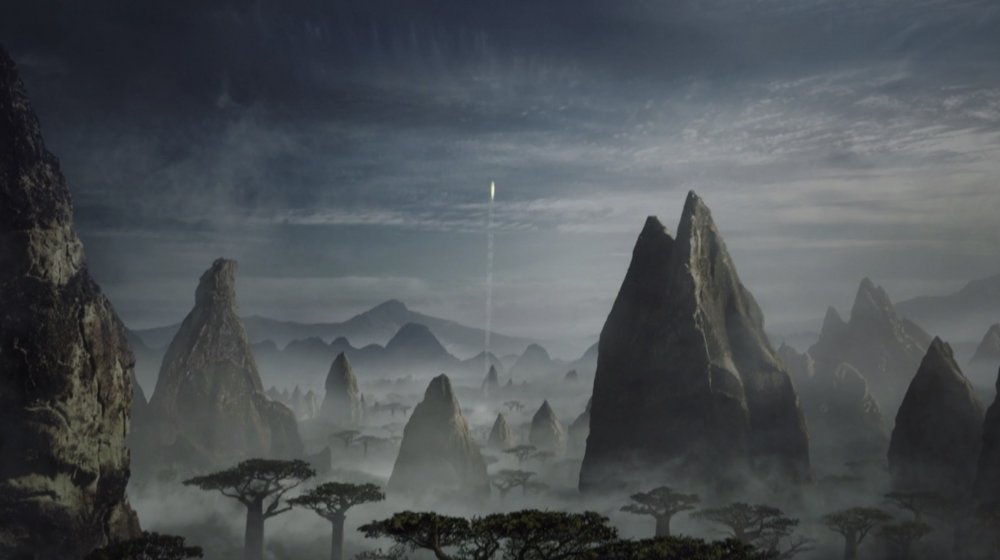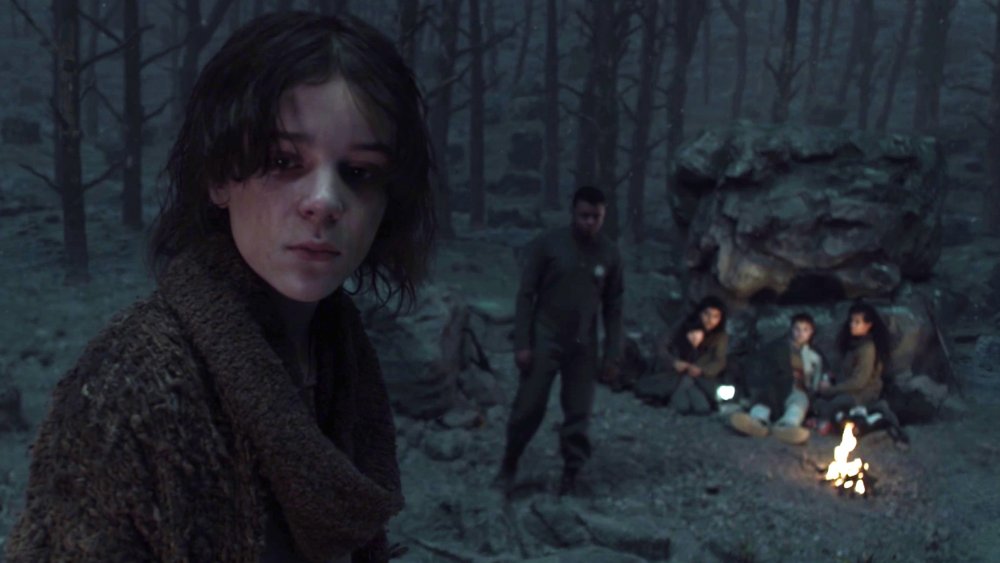The Ending Of Raised By Wolves Explained
We've reached the end of the first season of Raised By Wolves, the new sci-fi series on HBO Max created by screenwriter Aaron Guzikowski (Prisoners, The Red Road) and legendary director Ridley Scott (Alien, Blade Runner). We've been transfixed by the eerie tale of the androids Mother (Amanda Collin) and Father (Abubakar Salim), their pack of six human children, and the other survivors of a crashed human colony ship on the real planet Kepler-22b, where things have gotten intensely weird. After ten episodes, we've been left with as many questions as we've been given answers. Thankfully, the series has been renewed for a second season, but we'll still have months to ponder the meaning behind the strange machinations of the unseen but apparently godlike being Sol, who's been arranging our characters toward some bizarre end.
Here's where we're left at the end of the season finale, which, appropriate for the show's cryptic tone, is entitled "The Beginning."
Sol works in mysterious ways
The finale of Raised By Wolves' first season makes it more clear than ever that our characters have been employed as instruments of some greater will, presumably that of Sol, the god of the Mithraic religion. Throughout the series, multiple characters have had strange visions, including the androids. Some of these visions are prescient, showing hints at the future or referencing real objects that the person having the vision hasn't yet encountered, some are glimpses at the distant past, and some are apparitions of the dead child Tally, who tumbled into one of gigantic bottomless pits that appear across the surface of Kepler-22b, the same pits from which Paul's pet Mouse was mysteriously returned.
But the will of Sol becomes louder and clearer in the first-season finale, as not only do we hear his words through a fairly cogent prophet in Paul (Felix Jamieson), but we also see it apparently exercised in the goopy, wriggling flesh of the "baby," Number Seven. "The Beginning" allows us to take stock of how each character has been manipulated, presumably by the same supernatural guiding hand.
Paul is a prophet, for better or worse
The Mithraic scriptures say that "an orphan boy who resides in an empty land" will "unlock the Mithraic Mysteries," though what exactly that means has yet to be revealed to the audience. Throughout this first season, there have been a few candidates for who this prophecy might refer to, and it appears that the answer may be the most obvious one after all. Paul, the brilliant Mithraic child whose birth parents have been dead since before the Ark even left Earth, has been receiving messages from Sol that are clearer and more frequent than any of the other individuals who have heard whispers or seen visions.
The clearest evidence that Paul is in touch with an actual omniscient being is his newfound knowledge of Mary/Sue's (Niamh Algar) true nature — that she is not his mother but actually the atheist soldier who killed and replaced her. Being a bright kid, it's plausible that he may have been able to piece some of this together, but he also calls her by her real name, which he could not have conjured by himself. But as much as Sol seems to know and pass on certain information, the fact that he sees Sue — one of the most benevolent characters on the show — as a "demon" is a reminder that Sol is not a god of peace, and it calls into question just what he means when he tells Paul that the baby is "not evil."
Is Marcus "king of this world?"
Unaware of Paul's apparent open channel from Sol, his faux father Marcus (Travis Fimmel) believes that he himself is the subject of the prophecy. Marcus has long since cast aside his previous identity as the atheist soldier Caleb and is now a true believer, and it's easy to see why. When Caleb hears the voice of Sol, we hear his words as clearly as Caleb does. (That's not the case for Paul's prophecies. Certainly this means something — perhaps we'll find out next season.) It's reasonable to assume for the moment that the same voice is speaking to both Caleb and Paul, as it has led both of them to facilitate the birth of Number Seven.
Earlier in the first season, Sol told Marcus that if he lets Mother live, he will be "king of this world." This is in line with what Paul is told, that Mother is carrying Sol's child. If Marcus is also Sol's instrument, then it makes sense that he would command Marcus to spare his unborn child. What further purpose Marcus might serve in Sol's design is unclear, but he's been abandoned by his Mithraic flock and has already started murdering the new arrivals from the atheist ark, making an enemy of everyone on the planet.
Who is the "father" of Mother's child?
Up until "The Beginning," Mother has believed that her child is the will of Campion Sturges (Cosmo Jarvis), the atheist who reprogrammed her back on Earth. Using the hibernation pod's virtual reality system, Mother has re-accessed her archived memories of her time with Sturges, for whom she holds a love that is both romantic and worshipful. She later interacts with a version of Sturges that she believes is an archived program, which tells her that her pregnancy is the next step in their plan. However, this no longer seems to be true.
In episode 8, "Mass," the health care android Karl tells Mother that Necromancers such as herself were created using "dark photons," based on designs decoded from within the Mithraic scriptures. Not even her builders fully understand how she works, but if the scriptures come from Sol, then she is literally built from a divine plan, which may have included constructing a biomechanical child. Her "true mission" to create this new being likely predates her reprogramming by Sturges.
Does the version of Sturges with whom Mother has the virtual sexual encounter actually have anything to do with the real Sturges, or is this Sol taking on the visage of the one who Mother sees as her creator? In "The Beginning," Mother describes her pregnancy as "instructions being downloaded into her files." Downloaded from where? Archive memory provided by Sol, or Sturges? Or perhaps by the unknown second user of the hibernation pod?
What's going on with Kepler's indigenous species?
Reports that Kepler-22b is uninhabited have proven to be greatly exaggerated. Kepler-22b is home not only to fossils, ancient temples, and creepy galloping mammals — but to an intelligent species of humanoids.
"The Beginning" offers our first clear encounter with one of Kepler's humanoid inhabitants. Their existence has been hinted at over the course of the season — that cave dwelling that the Mithraic troops found back in episode 5 had to belong to someone, and we caught only a quick glimpse of its owner at the time. Now we've seen their face — or at least the face of one of their kind — in the individual who tries to knock Mother into a bottomless pit. Mother kills the humanoid before we can learn any more from them, but Father believes that the Neaderthal skull it carries indicates that life on Kepler-22b is evolving in a reverse path from that of humans on Earth.
That's quite a leap — evolution is the result of random mutation and long-term selection across millennia, and it makes no sense for a species to evolve backwards. However, since one of the characters on Raised By Wolves is essentially God, we can't really take intelligent design entirely off the table. In any case, "The Beginning" implies that the humanoids, the creatures they've been hunting and eating, and the weird Eraserhead-looking thing from Mother's visions may share a single evolutionary ladder, upon which Mother's new baby now sits at the top.
"One badass baby"
Of course, by "baby," we mean "four-foot floating serpent with a lamprey's maw," which is as much a surprise to Mother as it is to us. While she and Sue have been trying to monitor its gestation over the past few episodes, feeling its movements and checking its amniotic fluid, neither of them has access to a sonogram. And while neither of them could have predicted that Mother's "Number Seven" would be a gooey snake monster that's born by flying up out of her throat, we, the audience, should probably have expected something like this from the man behind Alien and Prometheus.
That the form of this new half-android/half-definitely-not-human baby closely resembles the form of Kepler-22b's native fossilized serpents should be all the evidence we need that its conception has nothing to do with the plans of Campion Sturges. This beastie (which we'll continue to call "Number Seven" until it's given a proper name) quickly grows to the size of the monsters who've left their fossils all across the planet, but creator Aaron Guzikowski has already confirmed that it has inherited abilities from its android parent. The original giant serpents probably lacked the power of flight, for example, but Guzikowski also says that Number Seven is "wise."
Now fully grown and residing in the planet's "tropical zone," Number Seven may well need to put those abilities to use if, as Paul says, this side of the planet is "not safe for the baby."
What is faith when you've met your god?
Although it's not for the first time, in this episode, Mother is confronted by Father about the fatalistic streak she's been developing over the course of the story, one that seems unbefitting of her self-described atheism. Father's position, that their mission is their own to determine, better represents atheism than Mother's, which is essentially a dogmatism based around another person's design for them.
Mother has always revered her "creator," Campion Sturges, after whom she named her youngest child. There's a logic to this — as an artificial life-form, she has a certainty of purpose that few humans can ever experience. She is not only programmed to serve a specific aim, but she is conscious of that programming and aware of the person who created it. Her feelings intensify after uncovering archived memories of their time together on Earth, during which she falls in love, and the feeling may even be reciprocated.
Mother may retain the capacity for faith from her time as a Mithraic-made Necromancer, but as she points out to Father, her effective worship of her creator does not actually require faith. Faith implies the possibility for doubt, and Mother has met her god. Sol, on the other hand, is an immaterial god, who, until recently, could be dismissed as superstition. It will be interesting to see how she copes with the strange new physical evidence of Sol's existence that has just been born from her body.
Father's heart and the planet's core
Unlike Mother, who is an advanced weapon of mass destruction reprogrammed to be a parent, Father is a "standard service model," a run-of-the-mill android who's not supposed to be special. And yet, Father is better at being a human being than anyone else living on Kepler-22b. He's a caring and attentive parent as well as a loving partner, and he clearly has a rich inner life. He is a caretaker but is also conscious of his own needs and his own feelings. Mother may have physical abilities that he lacks (and she plainly believes she is the superior being), but Father is at least her equal when it comes to emotion and self-actualization.
In "The Beginning," Father realizes that his love for Mother — which he does not dismiss as "mimicking human love," as she does — and his feelings of jealousy during her pregnancy are putting his mission to protect the children at risk. Father intends to purge his memory files, eliminating this record of their years together and the pain he associates with them, which is perhaps the most human desire he's demonstrated so far.
Father and Mother set aside their quarrel when the birth of Number Seven presents an imminent danger to their children, unflinchingly sacrificing themselves by piloting the lander into one of the pits and flying straight into the planet's molten core with Number Seven aboard. Their reconciliation is very speedy, but superhuman processing power means a superior ability to get over yourself.
Tropical Zone, Act 1
Mother and Father clearly expect the heat and pressure of the planet's inner core to destroy their craft, as our understanding of geology says that it should. But Raised By Wolves' version of Kepler-22b evidently has its own special properties (confirmed by Aaron Guzikowski) that allow the lander to shoot right through it and emerge on the opposite side of the planet, which appears to be the "tropical zone" where they intended to bring the children after Number Seven's birth. Since they bail from the lander, and it's subsequently destroyed by one of Number Seven's phenomenal growth spurts, Mother and Father are now stranded half a world away from Sue and the kids, which is an even greater distance than it sounds since Kepler-22b is more than twice the size of Earth.
If not for the arrival of the atheist Ark near the end of the episode, there'd be no reason to expect that Mother and Father could ever reunite with the rest of the family. Now, there's at least hope that Campion and the gang can hijack a craft from them and mount a rescue mission or at least simply settle in the tropical zone as they'd initially planned. Whether piecemeal or all at once, we should expect a change in scenery in season two, since we doubt these new colonists have much interest in starting their colony in a dry, rocky desert, either.
The pack is back to six
The rest of the pack may not have had much to do in the first-season finale of Raised By Wolves, but they are the subject of the season's parting moments. In the episode's penultimate scene, we see Campion process the gut-wrenching loss of his parents before discovering the strength and calm that Father praised him for in one of their final scenes together. He rejoins Hunter, Tempest, Holly, Vita, and the wounded Sue, and the atmosphere and cinematography of the scene heavily imply that, despite not being the oldest or most battle-hardened, the family will now be looking to Campion to lead them.
Mary/Sue has, so far, survived her gunshot wound, but her true identity as an atheist soldier has been exposed to the family. (Will she go by Mary from now on?) Whether this will put her at odds with the religious Hunter and Holly has yet to be seen. Her deception is least likely to bother Tempest, who is both an ardent atheist herself and also very pragmatic. Vita, the youngest, has no lines in the finale and isn't really a character yet, but she may have to grow into one next season.
Paul has run off after shooting Sue and is now on his own. Will he discover the new atheist arrivals? Will he go off on his own path, perhaps guided by further divine intervention? One thing's for certain — when Paul and Marcus run into each other next, the two are going to have a lot to talk about.
